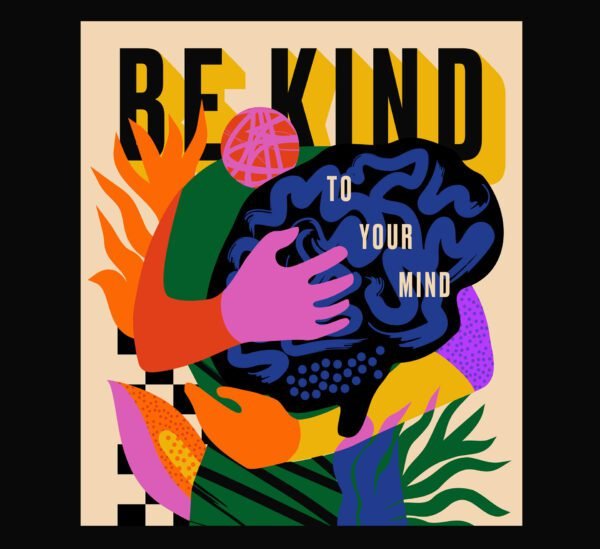My Week with Mental Health: A Student’s Perspective
If I had a euro for every time somebody mentioned mental health as a component of their problems, we would have enough money to dine at the Ritz. However, even though mental health is a part of all sorts of struggles and people express desire for more conversations about it, as IE students, we don’t really make space for that – at least not as a collective.
This is something that my peers and I have noticed, and I thought it would be great to take advantage of the initiative designed by the Center for Health and Well-being for IE Mental Health Awareness Week 2025. “IE Mental Health Awareness Week is a dedicated initiative by IE University Counseling aimed at fostering a deeper understanding and awareness of mental health within our community.” This year, the third edition of the series had “Breaking Silence” as its theme and was filled with a wide range of activities, talks, and workshops at the Tower and MM (Maria de Molina Campus) allowing students, faculty, and beyond to engage in valuable discussions about well-being. They also created a video compilation of staff, faculty, and students sharing their mental health stories which is available for everybody to watch at any time.
This specific theme emphasized IE Counseling’s commitment to promoting a community where we can openly talk about mental health, seek support, and be there for others – and more especially ensuring that these actions are seen as a sign of strength rather than weakness. It also gave us the chance to challenge taboos and encourage vulnerability, allowing us to better hear the voices of people sharing their experiences about menta; struggles. The end goal of this was to continue working towards breaking stigma, promoting self-care, and providing everyone involved useful tools to support not only themselves but people around them.
As a Behavioral and Social Science student, these topics speak to me both in and out of the classroom. I expected that these activities would not only open me up to people from other degrees interested in these topics but give me space to explore these ideas. I really liked the fact that each of these topics were quite different, ensuring diversity while maintaining the focus on the main theme of breaking silence, opening doors to much needed conversations. This was further facilitated by having a range of guest speakers and different staff members leading these discussions. I think that, a lot of the time, social initiatives – such as mental health programs within corporations – can feel more like a performative gesture than a genuine attempt to be impactful or change the culture. Other times, these can be attempted with the best of intentions and still have no real impact. I did have this in the back of my mind when attending these events, and I was curious to see if they would actually deliver on their aforementioned goals and be substantially beneficial in equipping us with helpful tools.
With these benefits in mind, my aim was to attend as many of the programmed events as I could. I ended up attending four events at the Tower and one at Maria de Molina. The activities I attended covered social media, the cross-cultural experience, men’s mental health, and healthy relationships. Each of these topics had their distinct qualities and audiences, therefore impacting me in unique ways. I will highlight two in this article.
Third-Culture Kid Workshop

The third-culture kid workshop had the widest variety of attendees from the events that I went to – we got perspectives from parents of third-culture kids and fellow undergraduate students who identify as third-culture kids themselves. The structure of the workshop encouraged a lot of reflection prompting questions about what terms or characteristics define our culture, using Hofstede’s Cultural Dimensions model.
I was surprised that the group was so small because something that really stood out to me when I came to IE was the fact that a large portion if not most IE students fit the definition of a third-cultural or cross-cultural kid. Among ourselves, it’s so commonplace that it’s not even something we reflect on, but on a global scale, it’s not necessarily the default. I found it really refreshing to have a heart-to-heart conversation about the joys and possible obstacles that come with this experience. We learned about fascinating concepts like hidden immigrants, and our guest speaker made the case that growing up at the complex intersection of cultures creates more room for empathy. This can be a tricky topic to talk about because, sometimes, highlighting some obstacles introduced by having cross-cultural upbringing can make it appear, as though you think it’s the biggest problem in the world. This couldn’t be further from the truth, and I really appreciate a comment that the guest speaker made, explaining that the perks of growing up abroad or at the intersection of cultures does not negate any possible difficulties faced with identity formation.
One key characteristic of TCKs is that they spend time outside of their passport culture during their developmental years. Identity formation is undeniably important for the human experience, and whatever impacts it – for better or for worse – is worth discussing or at least reflecting on personally. This workshop gave me the space to do just that.
Men’s Mental Health Discussion
The men’s mental health discussion featured a panel of four male guest speakers, including an IE bachelor’s student. The male and female moderators were also both students. It was really inspiring to see that it wasn’t just male students who showed up for the event because it’s really valuable to have people from other backgrounds listening attentively to another group’s struggles. It is very often in discussions like these that we stand the chance to gain a lot by simply listening well.
The panel explored the current mental health landscape across the globe, completmented with personal opinions or anecdotes from the guest speakers. Since all the panelists had different professional backgrounds, their perspectives on the different topics that arose varied enough to offer us a range of curious insights. We talked about the complicated usage of terms like femininity and masculinity, the vulnerability of being honest about one’s emotions, substance abuse, and therapy culture. This mindful discussion also made space to highlight the intersectional struggles of men’s mental health, particularly through the lenses of race and sexuality. I really enjoyed the Q&A session afterward because, although we all listened to the same conversation, the questions that emerged differed very largely from others within the audience, providing us with the opportunity to experience other people’s perspectives.
The questions posed in that workshop allowed me to gain a better understanding of the importance of checking in with yourself on things that matter to you, getting a good sense of what you really want out of certain connections you have, and being aware of the resources available to us as IE students – specifically, our ability to be in contact with the IE Counselling Center whenever we need support. The nature of a panel versus a single guest speaker-led discussion lends itself to a different dynamic and way of engaging with the topic. The diversity of approaches means that, no matter what you prefer, there’s still something that can work for you.

Casual conversations I’ve had have made me aware of several barriers that prevent IE students from participating in events like this. One that continually comes up or stands out to me is the discomfort with sharing personal stories. Although these events are designed to be a space for conversations and stories about ourselves or people important to us, if you are somebody who is more of a listener or takes time to warm up for these conversations, that should not discourage you from attending these events. I didn’t make many, if any, notable comments in several of these sessions; rather, I was an attentive listener curious to hear what other people wanted to bring forth on the topic and perhaps pose some questions when and where I felt it resonated with me. You are not required to share anything you don’t feel comfortable with, and you are always free to opt out of any of the activities. You are, in fact, encouraged to take time or space even during the session to process or gather yourself, ensuring that you never feel stretched undesirably out of your comfort zone.
I believe that the IE Mental Health Awareness Week initiative is something that everyone can benefit from. While not every event may resonate with you, I’m confident these events offer valuable insights and can shift perspectives on student well-being. This is not just based on my personal enjoyment of the event but also taking into account the abundance of positive feedback and the interest for engagement with the IE Counseling Center afterward. The great news is that although the IE Mental Health Awareness Week is over, the Counseling Department is here to stay. If any of the topics I’ve mentioned above and beyond feel like something that you would like to talk about, they always encourage you to reach out. And even if that doesn’t speak to you, there are more than enough opportunities to engage in discussions and events like this throughout the year. I hope that next year, even more of us are able to participate, and we can see even more of you at these important conversations.
The featured image provided by The Wall Street Journal.







